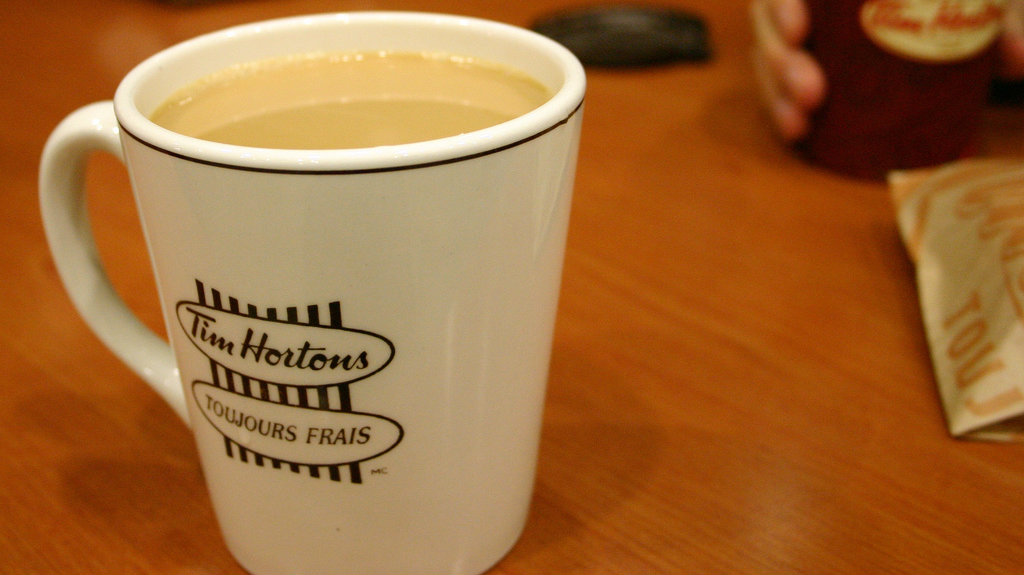After spending the better part of a year criticizing Restaurant Brands International Inc. (TSX:QSR)(NYSE:QSR) on how it runs its business, a trio of recent news stories about Tim Hortons has me throwing in the towel.
I officially surrender my bully pulpit, because it’s clear from its share price — up 22% in the past three months — that Restaurant Brands can do no wrong in the eyes of investors.
Whether we’re talking a good, bad, or ugly story about the Tim Hortons franchise, investors see a positive long-term outcome for the 3G Capital-backed restaurant operator; the one thing I’ve learned about investing is you can’t fight the trend.
The good
Tim Hortons announced July 11 that it’s about to take some of the spotlight away from Starbucks Corporation in China, opening 1,500 stores in the country over the next decade, which works out to three coffee shops a week.
That’s a lot of construction.
Leaning on its iconic Canadian identity, Tim Hortons looks to take advantage of the growth in the coffee culture in China. Currently, Starbucks has 3,300 stores in the country with an additional 2,700 to be added over the next four years.
“One of the things that makes us different from any other competitor is we have Canada in our brand,” Tim Hortons president Alex Macedo said in an interview. “We think that the Tims brand and our products can travel all over the world.”
Roots Corp. has done well in Asia with its obvious Canadian branding, so it’s possible this will also work for Tim Hortons.
Fool contributor Demetris Afxentiou recently discussed how Restaurant Brands’s experience opening Burger King in China should help it get to 1,500 Tim Hortons locations relatively smoothly.
This, perhaps more than its Canadian identity, will help Tim Hortons be successful in China. That said, I have to wonder about going up against Starbucks, which has staked its future on the country.
I guess time will tell, but it’s hard to deny this is a good story for the brand.
The bad
On July 17, Restaurant Brands announced that it would review its no-poaching clause in its franchise agreements that prohibit them from hiring employees from other franchises.
A 2017 academic paper from two Princeton University professors found that 58% of franchises in the U.S. with more than 500 restaurants used this clause to tamp down wages, despite a very robust economy.
Interestingly, Tim Hortons’s U.S. competitor Dunkin Brands Group Inc. dropped the no-poaching clause at its franchises (it also operates Baskin-Robbins) more than 15 years ago.
Frankly, I don’t need a university academic paper to tell me that’s not a good thing for employees. As far as I’m aware, very few non-recruit clauses are enforceable in either the U.S. or Canada.
If Tim Hortons is smart, it’ll drop the clause like a hot potato.
The ugly
Despite Restaurant Brands looking to play nice with franchisees, it continues to play hardball with Mark Kuzoria, a former franchisee whose franchise was taken back by the company for alleged food safety violations and failure to comply with the company’s operating standards.
Kuzoria, who is active in the Great White North Franchisee Association’s fight with the company over its frugal business practices, is suing the company, alleging that it’s decision to not renew his licence had everything to do with the GWNA’s vocal criticism of the company and not his personal operating standards.
The so-called dissident franchise group was planning a June 20th protest at Restaurant Brands’s headquarters in Oakville but opted to postpone it until a later date.
Optically, the longer this dispute carries on, the bigger the hit to its reputation. That said, I’m not sure anything can put a dent in QSR stock at this point.
The bottom line
Less than a week ago, I said Restaurant Brands wouldn’t hit $100 in 2018 because of its level of debt and over-reliance on Burger King. Now, I’m not so sure.
Good, bad, or ugly, Restaurant Brands’s momentum appears unstoppable. I wouldn’t buy its stock, but that doesn’t mean you shouldn’t.









